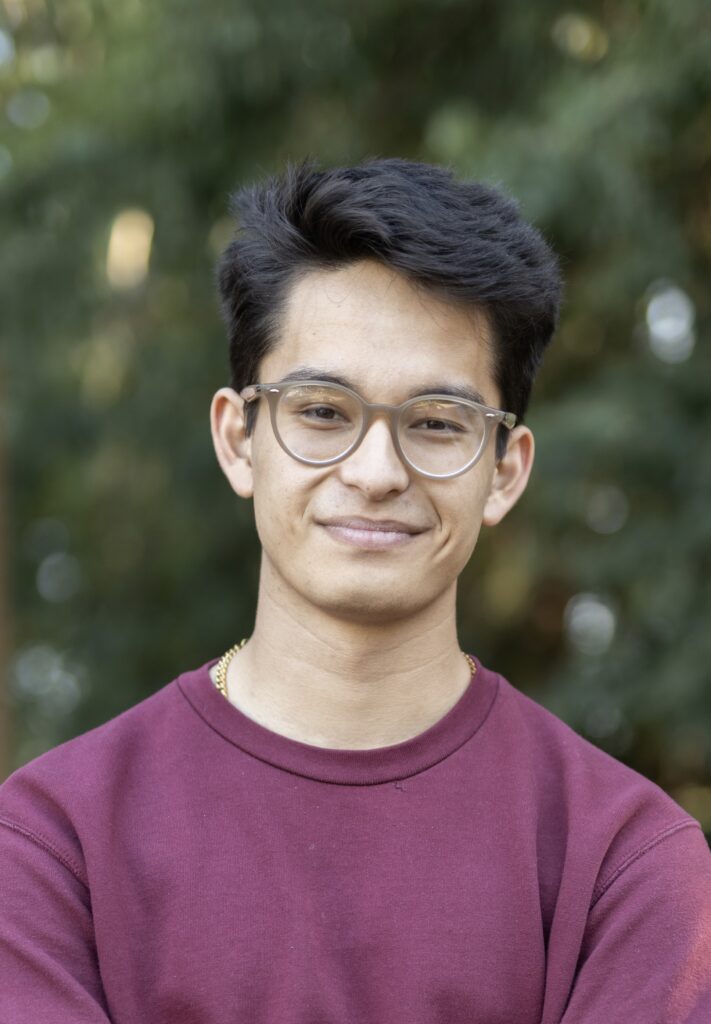Undergrad Profile: Andrew Kato
Andrew Kato is 4th Year Linguistics student who participated in the inaugural Undergraduate Research Fellows in Linguistics and Language Science (URFLLS) program and has been working with Pranav Anand, The Humanities Institute Faculty Director and a UCSC Linguistics Professor, since Spring 2024. URFLLS is administered by the Linguistics Department and is associated with the Employing Humanities Initiative. Recently, Kato’s research was accepted for presentation at the Amsterdam Linguistics Colloquium. We sat down to talk with Andrew about why he is pursuing a major in Linguistics, what his research experience has been like, and why he would encourage others to study the Humanities.

Hi Andrew! Thank you for sitting down with us today. Can you start by telling us a little bit about why you decided to major in Linguistics?
Sure! For me, linguistics wasn’t a major I thought about initially: I came to UCSC with a different humanities major in mind, since students don’t often have the opportunity to encounter linguistics as a distinct discipline until higher education. However, my first class as a college student here happened to be a linguistics course introducing formal semantics — that is, the study of natural language meaning. Semanticists incorporate methods from symbolic logic and computational reasoning to model the decomposed interpretations of what we say as language users. That course formed the genesis of my exposure to the field, and I became rather convinced at that point that linguistics would be the next step for me to pursue.
When did you start conducting research with the URFLLS program? And what have you been working on?
Through Spring 2024 to now, I’ve been working under Professor Pranav Anand to investigate non-canonical indicators of implicit bias across language models and human speakers. My contributions to this research are done jointly with alum Millie Hacker (C/O ‘24), and we interface closely with Professor Allison Nguyen at Illinois State University (C/O ‘23).
In a broad sense, we seek to address the question: How can tweaking the description of a referent lead language users/models to infer a socio-demographic profile that skews their decision-making? To this point, we are piloting an experimental design tailored to an instantiation of this research question as it relates gender identity.
Linguistics research can often inform the ongoing data-driven progress made in the field of natural language processing.
This project initially grew from (i) interest in the emerging literature in the field evaluating gender-biased tendencies among linguist-generated example data (e.g., stereotypically-male names commonly used as agentive subjects), and from (ii) a desire to innovate new ways of assessing gender bias in forced-choice/production tasks beyond English pronouns (e.g., “… the doctor said that {he, she} …”).
That sounds fascinating! I’d imagine that you are hoping this research leads to some improvements in the technology many of us use every day? Or at least more frequently with AI tools?
Linguistics research can often inform the ongoing data-driven progress made in the field of natural language processing. For our current project in particular, I’m certainly hopeful we can cover ground in how to improve debiasing for LLM decision-making tasks.
A classic and well-known use where this crucially comes into play is the parsing of applicant information for hiring processes. While that may not constitute technology we all use every day, it certainly is technology that impacts our long-term economic and social experiences.
Can you talk more about your experience in the course Linguistics 149 “Research Skills in Linguistics” that helped connect you to this project, and the mentorship you’ve received in the Humanities Division to pursue your own research?
The course component that the Department of Linguistics incorporates in the fellows program was a useful segue into what I do now. Data wrangling and visualization, for instance, are crucial aspects of any post-experiment analysis, and my familiarity with computer programming in the class has informed my current experiences leveraging PCIbex — a JavaScript-based system for experimental design and data collection.
Humanities is a great starting place to evaluate our own footing as students aspiring for industry…
My own current work is more theoretical than applied — falling under the general question of how proportional measurement (as with percentages or ratios) is compositionally interpreted. Being in a department that is rich in semantics research, and assisting Professor Anand (someone well-versed in formal semantics) under the bias-related project, have given me a formative environment in which to pursue this topic.
Fantastic. Lastly, I’m wondering if you can talk about what it has meant for you to be a Humanities student more generally and maybe why you would encourage other students to take classes in the Humanities. The Humanities Division has this new tagline, Reimagine the World. What does that phrase mean to you?
I can speak to linguistics here at UCSC, where cross-disciplinary efforts often emerge from smaller observations about sound patterns (phonetics/phonology) or structure-meaning asymmetries (syntax/semantics). I’m lucky to be a Humanities student in a field that can draw on tools from computer science, psychology, and otherwise into the scientific study of, in our case, language. I believe the flexibility it has with so many other majors is a primary pull-factor for students in taking Humanities courses, and linguistics courses in particular.
To reimagine the world is certainly a broad challenge, but I find it to be an important one for encouraging communication that cross-cuts backgrounds and interests. Humanities is a great starting place to evaluate our own footing as students aspiring for industry- or research-level endeavors as next steps.
If you are a Linguistics student interested in learning more about URFLLS, email ling@ucsc.edu. If you are a humanities student interested in faculty-led research, apply for open positions in the Humanities EXPLORE Program. The Mellon Foundation, The Helen and Will Webster Foundation, The Humanities Institute, and the UCSC Humanities Division generously support the Humanities EXPLORE Program.
